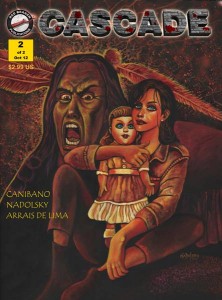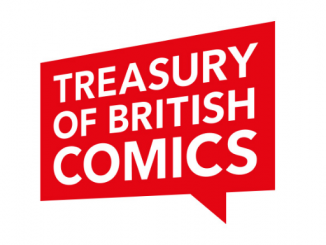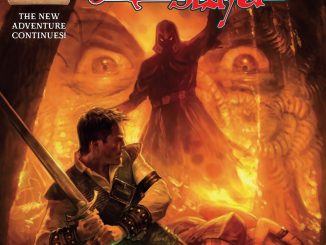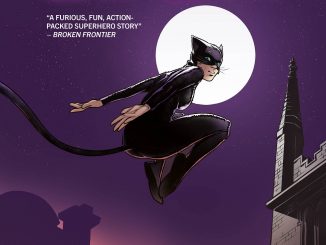10 Questions with Liam Webb of Red Branch Publications – who’s work I previewed here
1. Who are you and what are you working on right now? (2 questions in 1, I know!)
Good day to everyone far and wide! My name is Liam Webb, and I am the founder/editor of Red Branch Publications. I began Red Branch just over two years ago after working in the independent industry for a few years. Those years gave me the experience I needed in a variety of skills which, when taken together, enabled me to run my own comic company, so I decided that is what I would do. But beyond those nuts-and-bolts lessons, I saw a niche that wasn’t being served (well, a few niches in fact but that’s another interview entirely) ― that of non-gore fest horror and non-cynical science fiction that didn’t require half year or more commitments ― and, wishing for more of that myself, I thought I could do nothing better than to serve that niche.
Right now I am hard at work on many things. First, I’m working on having the remaining Red Branch stories colored and lettered, then compositing them into full books for distribution. The majority of the books I’m producing have two stories in them, and a few even have three, which gives more variety and reading value to the consumer. Once complete, the comics will become 5 issues of our anthology horror-suspense series Grotesque, 7 issues of our anthology science fiction series Strange Science Adventures, a stand-alone detective comic (which might be published as a 6th Grotesque issue), a hero adventure series made of a 4 issue comic story and a stand-alone comic entitled Blue Dragon, 2 stand-alone anime comedy-adventure comics Kung Pao and Meatballs and Blue Dragon: The Animated Adventure, and a 3 issue comic story tentatively titled Gladiator which is a sword-science-sorcery adventure comic. Separate from this, I am finishing off production work on an illustrated children’s book tentatively titled Maxine and Maggie which is aimed at young children, in particular young girls. Finally, I am also in the process of formatting for our short fiction (prose) 230 page book Strange Worlds which should be available on Amazon soon.
So that’s one way of answering the question of what I’m doing. Another way is by telling you that I did the math the other week and discovered that, counting from my very first day of business, I have averaged a page of comic work (written, penciled, inked and in somecases lettered and colored complete) every single 1.5 days (this doesn’t count the prose book). The reason I haven’t released more books so far is that I decided to wait to release the series until all the work was done so that I didn’t get caught with an erratic release schedule which seems to plague so many independent efforts today.
Concurrently, I am working on some marketing efforts for Red Branch’s first published comic book, Cascade, written by Chris Canibano with art by Larry Nadolsky and available on drivethrucomics.com.
I am doing this marketing work, as well as other marketing efforts, with Stephanie Hunter, who is a wonderful artist and entrepreneur in her own right on Etsy.
In my spare time I also am teaching myself coloring on Manga Studio 5 as well as medical writing and transcription so I can add medical work to my freelance jobs which help to fund everything.
Separate from all this, I do an English translation for Marcel Hauck’s webcomic Astro Ape (http://www.astroape.de/), I am the writer for Aayumi Productions’ forthcoming comic series tentatively entitled Kaal (https://www.facebook.com/AayumiProductions), I have begun to maintain my own blog on Sundays “Adventures in Comic Book Publishing” which I made to help other young creators in the industry (http://liamwebb.wordpress.com/), I sometimes review comics for Self Publisher! Magazine (http://www.selfpubmag.com/start.htm), and in my “day job” I am a freelance writer and editor.
2. What drew you to digital comics?
I was drawn to them for much the same reason many small comic businessmen are; they are the most practical way to distribute if you don’t have a Diamond deal which is expensive, but in my case I also see it from the customer’s perspective.
First is practicality. It’s no secret that the American economy hasn’t been doing well these past few years and still isn’t good, and I have recently begun to hear from other businessmen reports of a business slow down (which you won’t hear about on the news until about 6 months after the fact). Digital is simply the cheapest and fastest way to get your work out before the public. The hope is that if the digital copies sell well enough, I will be able to put those proceeds into a print run faster than if I did so through my own funds alone.
Secondly, but no less importantly, digital comics are also more accessible for younger people and the female audience (or so it has been reported) so any businessman would be remiss if they didn’t include a digital version nowadays. The comic industry’s profits have lowered in recent years, in part (in my opinion) due to outdated distribution and selling models. If comics stay solely in comic shops and out of big box stores and the internet, to say nothing of the complete lack of direct advertising like t.v. commercials and print ads outside of other comic books, the only thing the comics market can do is shrink as the new customer base fades away from the old ways of doing things. On top of this, going back to the economy, what suburban parent struggling with expenses would spend extra gas money on an separate trip to a comic store to spend more cash on comics for their children which are still seen negatively in some areas? Digital distribution avoids these costs for the consumer.
Digital comics are also a great way to build your brand, build your business and prove that you have a quality product for many people.
3. Webcomics or digital comics?
Right now I am focusing on digital comics because that is what I have worked on. A few months ago, I began work on a possible webcomic series, however, it was immediately impractical for the artist to focus on that work as well as do his other duties, so when that clears up for him, we are likely going to go ahead with a webcomic strip.
4. What do you think works with digital comics?
From a business perspective? Lower overhead for independent creators and possible wider distribution if you market correctly. From a creative perspective? Genres that aren’t well served right now in print comics, which sometimes I’m tempted to say is anything that isn’t superheroes but I know that’s been changing a little in the past 2-3 years. Digital also gives new writers and artists a stage/format in which to prove they can actually do the work to completion.
5. Can digital comics replace print comics?
Like many other things in the digital age, I don’t think it is impossible but I also don’t think they should, or ultimately, will. I don’t think it is impossible that they could eventually replace print after many, many generations of people used to a digital life, however, human beings are who they are. When you really look at things, you see that human nature doesn’t change all that much between centuries, even though every generation likes to think it is more advanced or developed than the past, so I don’t think the market for print books, comics or prose, will ever really go away, or at least, not for many centuries, and this is provided there is no great war or other disaster that makes electronic options obsolete for a while.
Besides this, there are a few other reasons I can think of off the top of my head.
A) A print comic is something that can’t be taken away from you at the click of a button the way Animal Farm was erased from Amazon a few years ago: (http://www.nytimes.com/2009/07/18/technology/companies/18amazon.html?_r=0). Even if that was a mistake, it shows what could happen if some malicious group/company/government so chose to do it after a consumer has already paid. I don’t think that will really happen however, because people are more canny than that and want to keep what they buy which they can do more easily if it is printed, especially now when money is tight nationwide.
B) The reading experience with a physical book and Kindle is simply different and there will always be people who just prefer the one over the other.
C) Beyond this, electronic files don’t age the same way a physical book does and therefore, they don’t carry memories in the same way. Many people, I’m sure, hold on to dog-eared copies of books they had when they were kids because it was read to them by a parent or reminds them strongly of that time in their life. An electronic file can never do that, simply because electronic page edges can’t be soiled by fingers or hold a crayon mark or grape juice stain, or smell like something that reminds you of exactly who you were that day.
So while not impossible, I think it is highly improbable digital comics will replace print comics.
6. How can print comics work with digital comics?
By marketing each other’s products back and forth, whether they do that by giving discounts on the one if you have a code from the other, or, as Marvel has recently tried to do, have scannable boxes that give you “extra” material in a print comic, or some other notion. I personally see digital as a “gateway” to print for consumers: if they like it online they might want to get a copy to keep physically. Print could conceivably do the same for digital, however, I think there are stumbling blocks using print as a gate to digital for reasons somewhat touched on above. If anything, print comics can give out free codes to unrelated or just different (within the same company) digital properties so a consumer can discover a completely different creator or story for free which would then result in another physical purchase of that unrelated book if they liked it online in a self-feeding system. However, that would mean a reader would have to be interested enough to go online for it to begin with, and some readers simply aren’t into going beyond what they already read for personal or financial reasons. So like many other things, it’s uncertain.
7. What don’t you like about digital comics?
A) Eyestrain. Staring at a smaller screen after a day job where you stare at a bigger screen isn’t an attractive recreation.
B) The lower financial bar for digital comics at times attracts people who just aren’t ready yet to make a comic either for storytelling or artistic reasons, and sometimes both. However, I almost feel like that is too cynical before I say it, since all arts, in all ages, had this problem. While it might be a bit more widespread just at the moment, like the dot-com bust and even the tailing off of blogging, once enough people realize that you can’t make any real money or get real exposure with it, it should die down (though I don’t think it will ever really go away).
C) Lack of organization. So many people are doing so many things, all separately, it becomes a Herculean task to even find some of them and after that to then separate the wheat from the chaff, and is something that many people don’t want to do. This is why reviews are so important in the various creative industries.
D) General socioeconomic bias. In order to have a digital comic, you have to have a computer. Not everyone even in the USA has a computer or can afford a new one every few years that can accept all the new programs which change/upgrade constantly. Digital-only’s downside is that it necessarily excludes the very poor or even “marginally” poor (both individuals and whole societies as compared to the US standard of living), and these are people who otherwise could be voracious readers who will never find you because they don’t have the technological possessions to start with.
E) As touched on before, I am one of those who personally don’t like “just” online offerings to “own”. If I really like something, I’d rather own a physical copy of it than just an electronic file of it.
8. What digital comics/webcomics do you read?
I read some digital comics for review purposes myself, but none currently for leisure. For webcomics, I read Penny Arcade and Scandinavia and the World every now and again, but nothing else regularly right now (I’m too busy working) though I do read the occasional random webcomics my friends send me.
9. Where do you see digital comics going from here?
Well, if they take 95 North after making the turn at the gas station, they’ll hit the NY metro area….Oh wait, that’s not what you meant.
I honestly don’t have an opinion on where digital comics will go, because that’s got far too many factors in it, the top two being price and quality (though there are more if I thought about it, like political changes/repressions of speech, wars that cut power indefinitely, etc, etc).
If the Big Two started putting their books out online nearly on top of, or concurrent with, publication date for half price of print then I think digital comics would explode. If they did so, the indies would have no choice but to follow suit price-wise, which is why I don’t say it is an independent creator’s job to do this kind of pricing shift. But if the large publishers keep charging the same as a physical copy then that will keep digital comics from growing at all, since the big companies sell mainly to adults aged 25 to 45 right now, and those adults, having grown up before the Internet, on average (like myself) have a problem buying “just” a file at the same price without the physical format. Whether younger comics readers will adapt to that price point for what they get remains to be seen, but I’m quite skeptical of that happening because, again, the economy isn’t very good right now.
Coupled with price is quality. If and when more high quality publications come out online that crowd out and then, by their presence and number, discourage the poor quality ones to the point that digital comics are assumed to have the same “respectability” as print comics (or even exceed it in my best hopes for the industry) then digital comics will grow as a culturally accepted thing. By “culturally” I mean all three levels: as a comic culture, a general reading culture and the wider social culture of a country.
10. Who do you think we should look out for in digital comics?
Well, I’d be a fool if I didn’t say to look out for more Red Branch comics when they become available scheduled for later this year, wouldn’t I?
But besides my own works, I’ve seen that Mark Waid’s Thrillbent is doing some great things. I can’t point to any one example off the top of my head unfortunately (I’ve not read it in some time due to my heavy work schedule), but I thought his site is great overall.
Outside of that, and I know this might sound tongue-in-cheek but it truly isn’t, but I don’t know of any one person right now who is working on a forthcoming digital comic to recommend them. I’m simply too busy working right now, but I do wish I could recommend someone to your audience. However if I did have the time, that would mean I wouldn’t be working so diligently to bring people more great Red Branch entertainment from our group of creators, and that would be a shame.
I thank you very much for the time taken for this interview. My best of luck to both readers and my fellow creators, and I truly hope you enjoy everything we publish.






